#videogame writing
Text
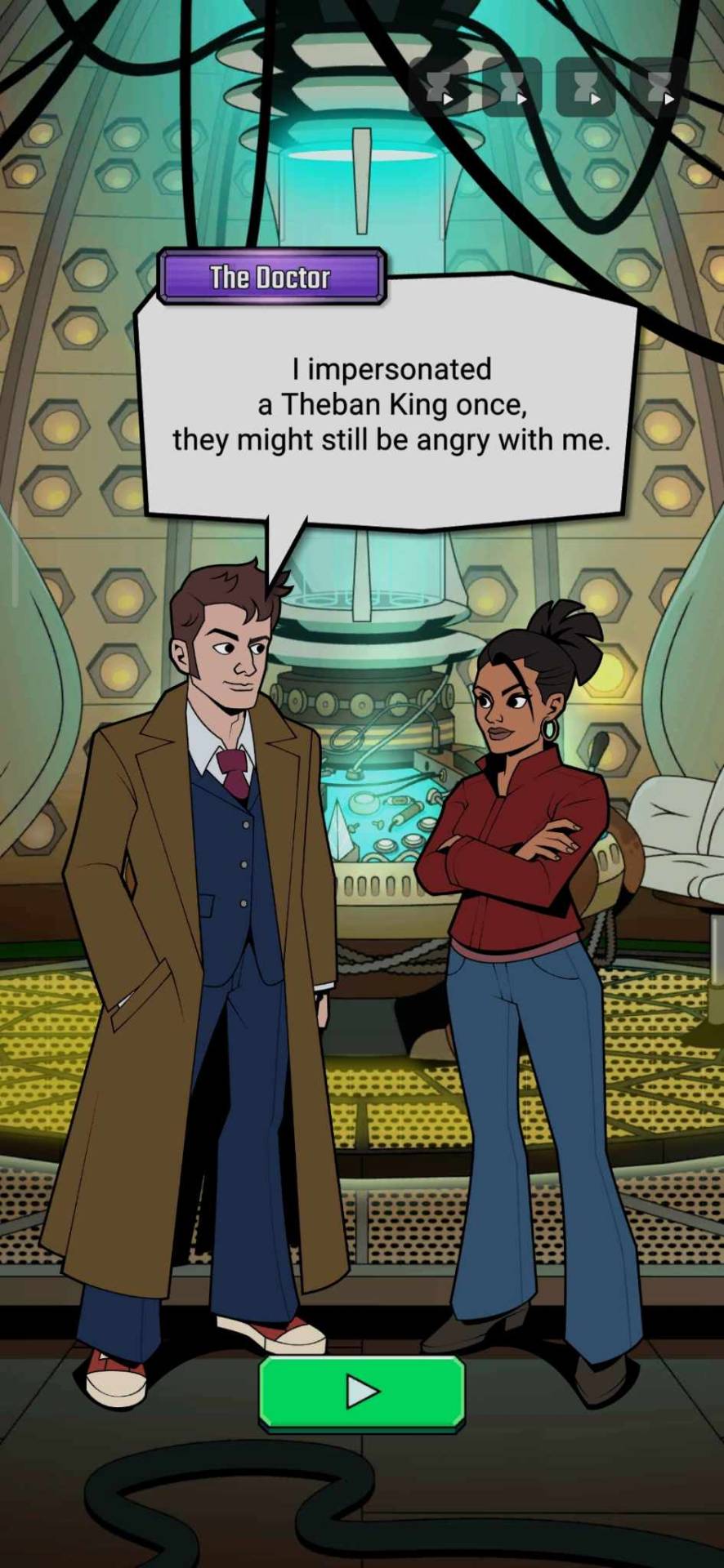
Proud of expanding the number of royal families pissed off by the 10th Doctor.
#doctor who lost in time#doctor who game#doctor who#10th doctor#david tennant#dw#Writing#Videogame Writing#Script
19 notes
·
View notes
Text
Why I am not a fan of the interns from psychonauts 2 in terms of writing
spoilers for most of the game. please play this game it is very good. spoilers begin after the cut.
Disclaimer 1: I love this game. If I hated it then I wouldn't be talking about it. I criticize the things i love because I believe in improvement from fair criticism.
Disclaimer 2: If you are personally attached to said characters and feel as though you are being attacked by reading this, politely piss off. I don't know you personally, and if you think my opinion on fictional characters is some slight against a random stranger, then you need to touch grass instead of spamming my feed.
With this in mind, this is my PERSONAL OPINION as to why i dislike these characters from a writer's standpoint
1- they are pricks.
i have been told "hazing is just a normal rite of passage!"
hazing is a dick move created as an excuse to prank newbies. I don't care how many fond memories you have of your frat house: hazing is something only assholes contribute to.
and you know what else is a dick move? bullying a 10 year old kid for no reason.
it is very normal for teenagers to group together with people that are the same as them, so i can believe this is a group of snobby little shits. If being bullies was the intended purpose of their characters I would be fine, but it conflicts with the story the writers want to tell.
which brings me to my next point
2- We barely get any time for them to develop
at the beginning of the game they are introduced as a group of little shits who bully kids for no reason.
not great but i can forgive giving characters flaws so they progress. People like that do indeed exist.
the problem: they don't seem to learn anything and they just randomly decide Raz is their friend during the casino mission. (and then later randomly shown up to save the day at the end even though they were missing most of the game)
"don't forget how i taught you how to grind rail raz!"
what???? you didn't teach us anything! you barely talk to us skateboard kid! Raz knew how to do that at the summer camp!
and like, this scene is very cool. the artistic style and the characters popping up like comic book panels
but none of that matters cus i have no reason to like any of these kids.
"but Raz proved himself that he is capable during the lady luctopus fight so they respect him!"
thank you for pointing that out obvious straw man I created to make up for my shitty argument skills.
but the thing is: just because these kids were proven wrong does not equal character development. They didn't learn anything other than to not mess with Raz specifically.
Which:
3- If you asked me their names, I can't tell you who is who other than sam (and we will get to her later)
let me describe these characters to you
-skateboard kid
-kid who is in a really cool lawn chair hover thing
-kid who got all of her clothing by stealing from construction workers and rodeo cowboys
-the other bitchy one but with a beanie.
- darius rucker with a yoyo
-and sam.
this shit is all i know from these characters. At best I know traffic stop clothing kid and the other one are sisters, but i literally only know that because Raz randomly pointed it out. (and personally, i think those two are the most unlikable of them all)
"ah you probably hate them because they are teenagers"
listen man. I am an original homestuck fan back when the main cast consisted of 13 year olds. The characters ages do not matter to me, but rather how interesting they are.
in Psy 1 the campers were full of personality and depth, BUT they didn't shoehorn them in expecting them to suddenly be all buddy buddy with raz. They were designed as fun background characters, and they served their purpose.
The interns problem is that they have the personality of very boring background characters, but they are not given enough time to develop as characters and are expected to be treated like a main characters. We spend all of our time with the Psychic 6 and not them (and i fucking love those guys!)
the Psychic 6 are the ones we spent our time with. THEY are the real main characters because we understood their struggles and got to learn about them. I was closet to THEM because i spent time with them.
I feel as though most of the interns were shoehorned in to appeal to a younger audience
ok now we can talk about sam
4- I think sam is only interesting because she is attached to Dogan
(please don't kill me i promise i am going somewhere with this)
If you don't know, sam is basically the explodey head kid's sister.
She has personality because she is attached to the most wholesome man of all time, and the weird kid from the first game with murderous tendencies. As a result of this, Sam has to be just as weird as her family members to make sense.
I guess her character wouldent change if you removed her familial status with the Boole family, but also consider sam is basically pinkie pie.
and Mable pines.
And Molly McGee
and basically every single quirkyyyyyy overly energetic female character in media with animal abuse sprinkled on top for comedy.
there is nothing wrong with this. I think sam is fun too.
But also she stands out like a real person in a room full of mannequins, mostly because her friends have the personality of mannequins.
The poor writing of the rest of the interns essentially makes sam worse by the law of association because sam is grouped with these losers.
in case you are curious, the "where did you get the milk" line cracks me up every time. poor Raz needs a hug.
5-They overplayed agent Forsythe a little bit too much and that does not help the interns in contrast.
first: i love Raz's arch about learning not to affect peoples brains like it's nothing. It gave me emotional whiplash because i played the first game right before this game, but the games have a 16 year gap between each other and times have changed. I won't blame the game for that, AND the whole "mental health is a serious issue" grew on me. very good story this game has.
Point is: Raz's consent arch was a really good thing for his character.
but also agent Forsythe is kind of a bitch.
first: your two agents brought you a kid who is enthusiastic about the psychonauts and your immediate instinct is to put him up with the mailroom clerk as his mentor? really?
Thinking Cruller is a fucking nut and not validating Raz's honorary psychonaut status? yeah fair. she has no reason to think Ford isn't batshit insane.
Getting on Raz for being late to class? also fair. She is a very strict teacher and needs to instill onto her kids that punctuality is important.
but then some things rub me the wrong way.
like you are an adult, how come you are letting these kids bully Raz? surely you saw the footage on the security cams?
Or how come Raz got blamed for invading her thoughts when it was the interns that shoved him into it? How come you are targeting the kid for this and not everyone else who was involved in this?
lets give her the benefit of the doubt and assume she didn't know about those things. Raz's story about him apologizing and learning from his mistake was still very good.
Then sasha and Raz have a very charming fatherly moment about learning when to bail from a dangerous situation. made me smile.
but then after all that emotional drama, you then talk to her and raz apologizes AGAIN and the emotional drama tries to continue. Lady you already had a talk to Raz about consent, why are you making him explain himself again out in the open? He is 10 years old and already learned his lesson, chill the fuck out.
and then later on she implies that she thinks Raz is the mole just because his family is from a fallen country related to the current issue. I understand not liking Raz, but is the racist remarks necessary? Do you seriously think some random kid kidnapped the head of the psychonauts? I know it is a serious issue but come the fuck on the kid barely knows how shapes work.
i know this is about the interns, but Forsythe rubs me the wrong way and i feel like she is the reason why these brats are the way they are. I feel like she makes my distaste for the interns worse because she comes off to me as a sad fuck who targets kids to fuel her fragile power tripping ego.
her level was good, and her arc with Raz was good, but she could use a bit of retooling.
I feel as though I can forgive her nastier flaws if she acted more like an adult and gave the teenagers the same amount of lip she gave Raz. Perhaps if she had stepped up the interns would be more likeable because they and raz could have a nice bonding moment over their mistake.
Tldr: Forsythe needed to act like an ADULT and discipline the interns just as much as she did raz instead of enabling them.
Overall, the interns are poorly written and I dread seeing them on screen.
I am not attached to them in the way i am attached to the Psy 6. The story of Helmet and Bob touched my heart, Agent Boole's mission about social anxiety related to me personally, the story of Cassiopea coming to terms with her past and identity issues, Learning about ford's mistakes and the trauma he collected, everything! I love these characters!
I guess the lesson is that just because a character is superficially the same as you, does not mean they are relatable.
I am in my 20's. I am not a teenager anymore, but I am not elderly either. I am actually closer to the interns in age than i am to the Psy 6.
And yet I relate to the Psy 6 more because these are human beings that i have grown to know and learn about.
I am a girl who plays videogames. Shocker I know.
and I have seen debates about "we need this and this and this or else i can't relate to the character!". There is not a lot of female characters in media and i agree that it would be nice to be represented more.
but a character being the exact SAME as you does not equal relatability.
I am not a grandfather with a tendency to make people explode, but i relate to Bool because we both share in our self judgement issues and the struggle to not want to hurt people with your personal problems. We have nothing in common physically, but we share in our struggles.
and that is why the interns failed as characters when the Psy 6 succeeded.
please don't spam my inbox about how much you disagree with me and how much you actually like the interns. this is just my opinion with writing advice sprinkled in it, much like Sam's personality.
#psychonauts 2#psyconauts#writing advice#writing#writing tips#creative writing#videogames#video games#videogame writing#character building#character writing#analysis#writing analysis
19 notes
·
View notes
Text
The issue with video games as a story medium has nothing to do with the fact that its a bad medium for stories and everything to do with the fact that gamers are fucking stupid
#game story#game stories#video game story#video games#video game storytelling#game writing#videogame writing#video game writing
2 notes
·
View notes
Text
Videogames I wish were real #97
A roguelike game that takes place in the world's biggest library, which has been overrun by monsters, where you play as a librarian determined to save it. You venture inside the library armed with your weapon of choice and two messenger bags you plan to fill with whatever books you can rescue.
After you clear the monsters in a particular section of the library, such as the Poetry section, you'll unlock a permanent buff that will last for the remaining of that run. For example: clearing the Travel section will help you map areas faster, and also unlock the bookworm railway system that will allow you to move more easily between certain parts of the library.
Besides section buffs, you'll also be able to learn all kinds of useful attacks and skills by finding specific books in the shelves, reading them and carrying them in your messenger bags. The more books you carry, the stronger your character will be, and the abilities each book will grant you will be on theme with the book, it's literary genre or one of its tropes: carrying with you a bestiary will allow you to quickly identify the weak points of monsters you've met before, a book with an enemies to lovers trope will allow you to turn a monster into a temporary ally that will fight alongside you, a botany book in your bag will let you gather medicinal herbs growing in the library, and carrying a potions book will allow you to prepare healing potions (more effective than just herbs), etc.
Not everyone believes the library can be saved, which is why during your expeditions your mission is not only to kill monsters, but also to rescue books and bring them to the new library. Since getting books out is one of your main priorities, starting your runs with your satchels nearly full of books that grant you useful abilities won't be very efficient, so you'll need to decide how many books you want to bring back with you to the library during each run.
Fighting monsters is dangerous, and sometimes you get hurt, but also, sometimes books get hurt, which why after some runs you might need to stop by your workshop to repair any damaged books. The hides of certain monsters are very sturdy, so using them to rebind books will make them more durable.
There is no respawning in this game. If your librarian dies inside the library, the next librarian that ventures inside might eventually find their body. If you're close to death and you have a particular book from the Travel section in your bags, you'll be able to use it to summon a bookwork that will take you quickly and safely back to the entrance with whatever books are currently in your bag.
You love your library, and you are determined to save it, armed with the greatest weapon in the world: knowledge (and a sword), even if it's one book at a time.
#viwwr#videogames i wish were real#videogames#video games#writeblr#writers on tumblr#concepts#game design#roguelike games#libraries#books#finished writing and proofreading this 8 minutes before posting time oopsie
2K notes
·
View notes
Text
Getting whiplash going back to Armored Core VI after playing Starfield
Starfield trips over itself letting you know all of the quests are chill and good actually. The choices in dialogue range from doing a good deed to doing a good deed… for money😈. The only way to join the Space Pirates is to be offered the chance to go undercover first, making sure you see the Pirate but you’re a good guy option. If a persuasion check with someone fails, leaving you only with the prompt [Attack], your companion will say something to the effect of “woof, that was rough. But you did what you had to do.”
The most recent mission I finished in Starfield was for the United Colonies. You stand in front of a council of bureaucrats trying to convince them to hand over banned archival weapon data. This could help stop a small but growing danger to the galaxy. The council argues that it could also lead to that weapon falling into the wrong hands - It was locked away for a reason. It’s a great moment because it was the first time a character in starfield stood up and said to me No, you are in the wrong here, your research could lead to the weapon data leaking, civilians will be put it danger. ALERT. oh no. ALERT. Just as this conversation is happening an entirely contained but also extremely dire attack occurs. ALERT. You rush out and save the day. The threat is proven to be real and the data is necessary. No more questions about is it the right thing to do. Forget about all that other stuff we brought up, you were right. The whole council apologizes to you profusely. Here, take the nuclear launch codes, and here’s a thousand credits as an apology for insinuating that you weren’t the galaxy’s goodest bestest boy.
Mission 1 of Armored Core 6 is called “Illegal Entry”.
In mission 4 “Destroy the transport helicopters” the helicopters are just that. No weapons. Trying to run from you. The rubiconians who stand between you and the helicopters are defending their families. During the fight the enemies bark about you being the bad guy. After the mission your Dad calls you and says “It’s just a Job 621. All of it.” Throughout the entire game you are flooded with voicemails, calls, voices in your head, that all have an opinion on whether what you’re doing is good or bad or just a job.
Starfield is telling you not to think about it too hard. Armored Core is telling you to think about it. A lot. Screaming at you to think about it. What are you doing. It’s not just a job. The game is talking about your actions through all sorts of different lenses.
It’s stepping out of a lazy river and then immediately riding down Niagara Falls in a barrel. Sometimes literally. You see the same safe boring landing cutscene a million times in Starfield. Twice 621 has packed themselves into a barrel and yeeted it into danger.
#gaming#writing on games#armored core vi#starfield#games criticism#game design#fromsoft#Bethesda#621#writing#ac6#armored core 6#videogame essay
3K notes
·
View notes
Text

Happy Caturday here is my fav picture of Peach that I caught mid sneeze

And heres Peach now with her Sister Lucipurr
#coven pets: peach#coven pets: lucipurr#follow me for cat pics#Also art and writing#and videogames#i got the range#blazing it
1K notes
·
View notes
Text

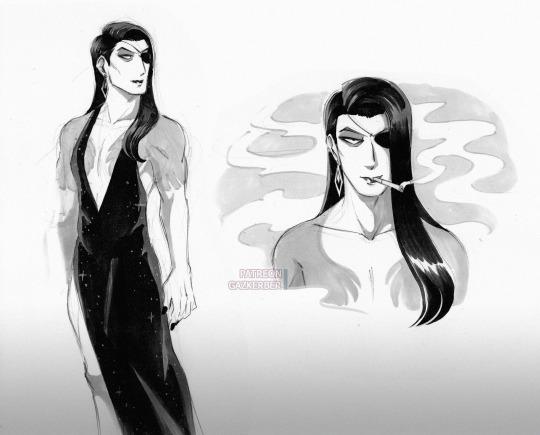
Always thinking about her
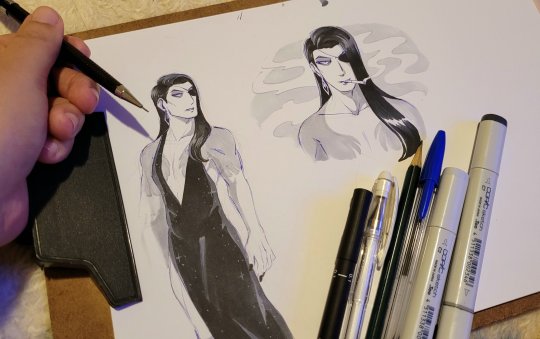
Here's how she looks on paper and some of the stuff I used to created her ❤
#yep I'm still writing that doujinshi heeheh#yakuza#like a dragon#ryu ga gotoku#rgg#龍が如く#真島吾朗#majima goro#goro majima#goromi#ゴロ美#fanart#my art#gazkerber#illustration#games#videogames#80s goromi
352 notes
·
View notes
Text
Generating plasm and stacking matchboxes: how to build a better future through collective consciousness.
Alternatively - Steban and Ulixes were building Tatlin's Tower so I have to talk about the symbolism or I will explode!!
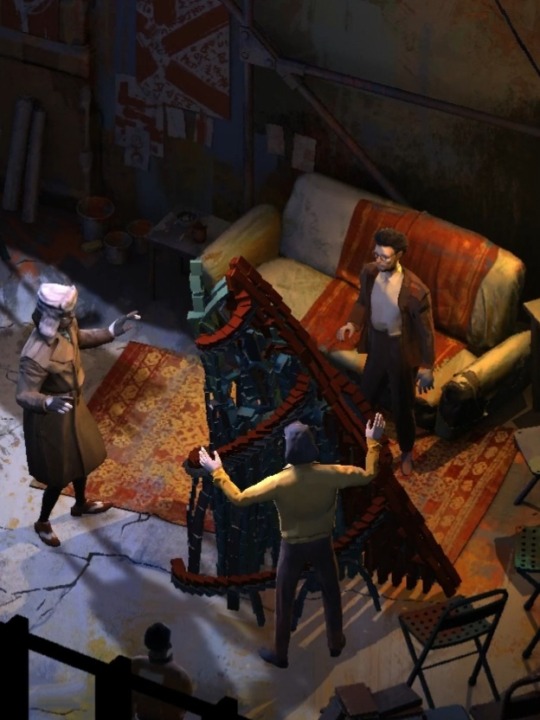
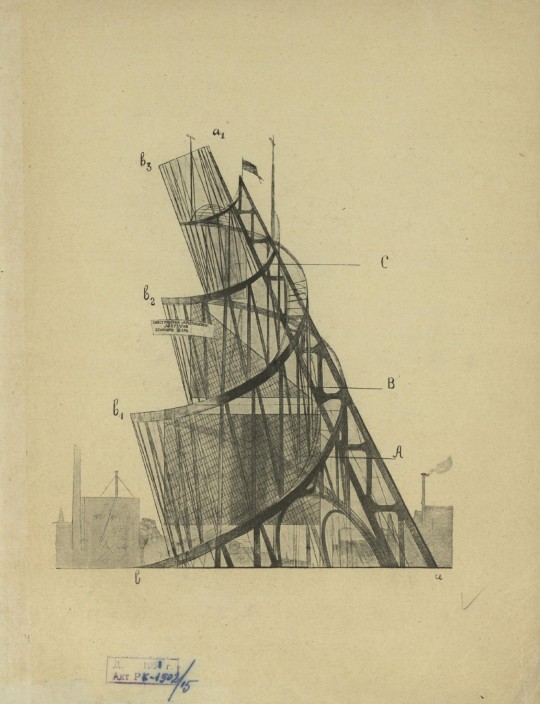
While completing the communist vision quest you get an opportunity to build a model of "The Tower of History", depicted on the last page of "A Brief Look at Infra-Materialism": a leaning tower wrapped in a dramatic helix. The scale model you make is a mirror image of Tatlin's Tower - a design for a grand monumental building to the Third International: the government organization advocating for world communism.
The main idea of the monument was to produce a new type of structure, uniting a purely creative form with a utilitarian form. Meaning it would function as an office building while also serving as a symbol of cultural significance. And let me tell you, this bad boy can fit so much symbolism in it.
Tatlin was commissioned to develop a design in 1919, after the 1917 February Revolution - a parallel to Disco Elysium's Insulinde we're witnessing post-Antecentennial Revolution.
Tatlin's work was inspired by high revolutionary goals, which are evident in the visual direction of the tower as well, expressing the ideological strive for achieving something that has never been done before, overcoming the odds. The structure "oscillates like a steel snake, constrained and organized by the one general movement of all the parts, to raise itself above the earth. The form wants to overcome the material and the force of gravity..."
The tower has meaning packed even in the materials. For example, the glass structures (marked A, B, C on the architectural rendering) were meant to serve legislative, executive and informative initiatives while rotating around their axes at different speeds. The material signified the purity of initiatives, their liberation from material constraints and their ideal qualities.
But here's the best part. The spirals.
"The spiral is the movement of liberated humanity. The spiral is the ideal expression of liberation: with its base set in the earth, it flees from the ground and becomes a symbol of the suspension of all (...) earthy interests." They are "the most elastic and rapid lines which the world knows" that represent movement and aspiration, continuing the themes of progress and freedom, but they also refer to something else.
In the process of building the matchbox model Rhetoric points out: "It's almost exactly as Nilsen's sketch imagined, a physical manifestation of the dialectical spiral of history."
The shape of the tower is a representation of dialectical development of history, first visualized as a spiral by G. W. F. Hegel. He pictured transformational change as "both linear and circular in order to be short-term responsive, i.e. possibly negating itself, and long-term strategic, i.e. a process of development."
Hegel's dialectics would later be reinterpreted through the prism of materialism by Marx and Engels to create dialectical materialism - the basis for historical materialism.
"Still, this idea, as formulated by Marx and Engels on the basis of Hegels’ philosophy, is far more comprehensive and far richer in content than the current idea of evolution is. A development that repeats, as it were, stages that have already been passed, but repeats them in a different way, on a higher basis, (...) a development, so to speak, that proceeds in spirals, not in a straight line; a development by leaps, catastrophes, and revolutions; (...) the interdependence and the closest and indissoluble connection between all aspects of any phenomenon (history constantly revealing ever new aspects), a connection that provides a uniform, and universal process of motion, one that follows definite laws - these are some of the features of dialectics as a doctrine of development that is richer than the conventional one."
The tower embodies progress in materialist understanding of history while also indicating the connection to ideological plasm, a manifestation of "the proletariat's embrace of historical materialism", necessary to create a better future.
According to Nilsen, the proletariat of a revolutionary state can generate enough plasm to create extra-physical architecture that "disregards the laws of 'bourgeois physics' and instead relies on the revolutionary faith of the people for structural integrity."
This function of plasm implies that The Tower of History can be created only under revolutionary circumstances - without a sufficient amount of plasm even the matchbox model didn't stay up. The exact same sentiment is expressed about Tatlin's Tower: "We maintain that only the full power of the multimillion strong proletarian consciousness could bring into the world the idea of this monument and its forms. The monument must be realized by the muscles of this power, because we have an ideal, living and classical expression the pure and creative form of the international union of the workers of the whole world."
Nilsen called it "the highest expression of Communist principles, a society whose literal foundation is the faith of its people."
Tatlin's Tower was a symbol of faith in the revolutionary future, the global triumph of Marxist socialism. A monument "made of iron, glass and revolution."
It was never built in real life, and neither was The Tower of History in the world of Elysium.
But you can try to see if there's enough plasm between the three of you. And the matchbox tower stays up for a long moment, quivering with an improbable energy. You believe it can say up - and it does.
So you have to believe; whether it's for collective action or generating ideological plasm. Then, together, maybe you'll be able to build as much as 0.0002% of communism.
#i tricked myself into reading leftist theory for disco elysium#never thought i would be reading Lenin to write about videogame worldbuilding#tower related quotes are from ''The monument to the Third International'' by Nikolai Punin#infra-materialism#disco elysium#de#de meta#disco elysium analysis#disco elysium spoilers#disco elysium meta
642 notes
·
View notes
Text



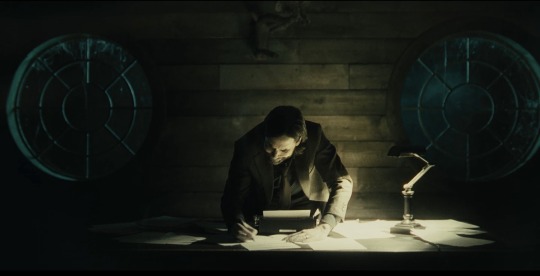

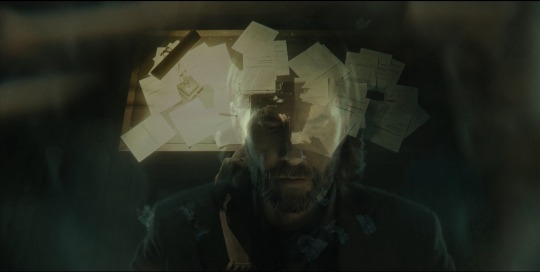
#the next chapter the next chapter the next chapter#writing is fun - editing is hell#alan wake 2#alan wake#our favorite tortured writer™#ilkka villi#the writer’s room#videogames#horror games#remedy entertainment
154 notes
·
View notes
Text
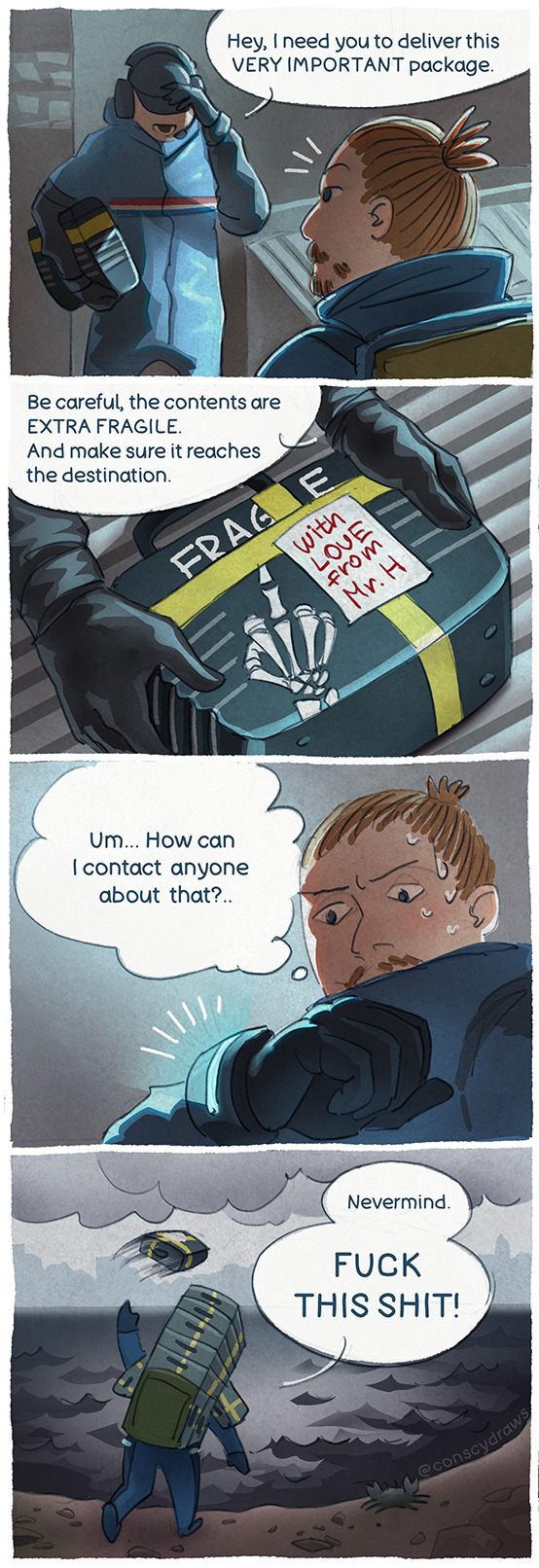
Order 38. Undelivered.
#conscydraws#death stranding#I was soooo confused#Everyone was so chatty just a moment ago#I've been feeling watched and tracked every fucking second#Hi Sam. Here's some more work Sam. Don't build your generator here Sam. Sam Sam Sam Goddamit!#And when I needed them the most everyone suddenly fell silent and I was standing there like an idiot not knowing what to do#Luckily prior to that I disposed of some Junk Dealer's trash in attempt to win his trust (spoiler: it didn't work!)#so I connected the dots by myself#But still i felt uneasy and furious that my comm works only one way#I understand. game mechanics and all that.#But I've really felt myself in the skin of Sam in that moment#I like that DS is so immersive#But I would prefer that they wouldn't write the contents of the package so openly#Let the people find it out by themselves#death stranding fanart#death stranding spoilers#sam porter bridges#higgs monaghan#videogames#silly comics
84 notes
·
View notes
Text
Folks going "WHAT they made a show about the Fallout franchise?? I've been hearing people say Bethesda messed it up, but I haven't watched it myself, so I'm going to trust the word of other people -- some of which also haven't finished watching it" is driving me insane.
Being a hard core fan of something obviously brings with it a lot of passionate feelings when adaptations come into play. Of course, there's going to be people going "but in 8 episodes of the first ever season they made, they didn't explore Theme C or D, didn't introduce factions E and F and G, and because the source company is notorious for its scams, we and everyone else who's a TRUE fan should hate it".
The Amazon Original series Fallout follows the videogame franchise of the same name. It is a labour of love and you can tell by the attention to detail, the writing, the sets, and YES THE THEMES ARGUE WITH THE WALL. It's clearly fan service. I mean, the very characterisation of Lucy is a deadringer for someone playing a Fallout game for the first time. She embodies the innocent player whose expectations drastically change in a game that breaks your heart over and over again. Of course, she's also the vessel through which we explore a lot of themes, but I'll get to that.
There're some folks arguing that the show retcons the games, and I gotta say... for a website practically built on fandom culture, why are we so violently against the idea of someone basing an adaptation on a franchise that so easily lends itself to new and interesting interpretations? But to be frank, a lot of what AO's Fallout is not that new. We have: naive Vault dweller, sexy traumatised ghoul that people who aren't cowards will thirst over, and pathetic guy from a militaristic faction. We also have: total atomic annihilation, and literally in-world references to the games' lore and worldbuilding constantly (the way I was shaking my sister over seeing Grognark the Barbarian, Sugar Bombs, Cram, Stimpaks, and bags of RadAway was ridiculous). Oh, and the Red Rocket?? Best pal Dogmeat? I'm definitely outing myself as specifically a Fallout 4 player, but that's not the point you should be taking away from this.
The details, the references, and the new characters -- this show is practically SCREAMING "hey look, we did this for the fans, we hope you love it as much as we do". Who cares that the characters are new, they still hold the essence of ones we used to know! And they're still interesting, so goddamn bloody interesting. Their arcs mean so much to the story, and they're told in a genuinely intriguing way. This isn't just any videogame adaptation, this was gold. This sits near Netflix's Arcane: League of Legends level in videogame adaptation. Both series create new plots out of familiar worlds.
Of course, those who've done the work have already figured out AO's Fallout is not a retcon anyway. But even if it was, that shouldn't take away from the fact that this show is actually good. Not even just good, it's great.
Were some references a little shoe-horned in to the themes by the end of the show, such as with "War never changes"? Yes, I thought so. But I love how even with a new plot and characters, they're actually still exploring the same themes and staying true to the games. I've seen folks argue otherwise, but I truly disagree. The way capitalism poisons our world, represented primarily through The American Dream and the atomic age of the 45-50s that promoted the nuclear family dynamic -- it's there. If you think it's glorifying it by leaning so heavily into in the adaptation, I feel like you're not seeing it from the right angle. It's like saying Of Mice And Men by John Steinbeck glorifies the American Dream, when both this book and the Fallout franchise are criticisms of it. If you think about it, the post-apocalyptic world of Fallout is a graveyard to the American Dream. This criticism comes from the plots that are built into every Fallout story that I know of. The Vaults are literally constructed to be their own horror story just by their mere existence, what they stand for, what happens in each of them. The whole entire show is about the preservation of the wrong things leading to fucked up worlds and people. The missions of the Vaults are time and again proven to be fruitless, unethical, plain wrong. Lucy is our brainwashed character who believed in the veritable cult she lived in before she found out the truth.
So then consider the Brotherhood of Steel. I really don't think it exists in the story to glorify the military. We see just how much the Brotherhood has brainwashed people like Max (also, anything ominously named something like "the Brotherhood" should raise eyebrows). Personally, I don't like Max, but I am intrigued by his characterisation. I thought the end of his arc was rushed the way he "came good" basically, but [SPOILERS] having him embraced as a knight in the Brotherhood at the end against his will -- finally getting something he always wanted -- and him grimly accepting it from all that we can tell? Him having that destiny forced upon him now that he's swaying? After he defected? If his storyline is meant to be a tragedy, it wouldn't surprise me, because Fallout is rife with tragedies anyway. And a tragedy would also be a criticism of the military. That's what Max's entire arc is. It goes from the microcosm focusing on the cycle of bullying between soldiers to the macro-environment where Max is being forced to continue a cycle of violence against humanity he doesn't want to anymore because a world driven to extremes forces him to choose it to survive (not to mention what a cult and no family would do to his psyche). Let's not forget what the Brotherhood's rules are: humankind is supreme. Mutants, ghouls, synths, and robots are abominations to be hated and destroyed. If you can't draw the parallels to the real world, you need to retake history and literature classes. The Brotherhood is also about preserving the wrong things, like the Vaults (like the Enclave, really). They just came about through different method. The Enclave is capitalism and twisted greed in a world where money barely exists anymore. The Brotherhood is, well, fascism plain and simple.
Are these the only factions in the Fallout franchise? Hell no. But if you're mad about that -- that they're the main ones explored, apart from the NCR -- I think you're missing the point. These themes, these reminders, are highly relevant in the current climate. In fact, I almost think they always will be relevant unless we undergo drastic change. On the surface-level, Fallout seems like the American ideal complete with guns blazing that guys in their basements jerk off to. Under that surface, is a mind-fuck story about almost the entire opposite: it's a deconstruction of American ideals that are held so closely by some, and the way that key notion of freedom gets twisted, and you're shooting a guy in-game because it's more merciful than what the world had in store for him.
I mean, the ghoul's a fucking cowboy from the wild west character he used to play in Hollywood glam and his wife was one of the people who helped blow up America in the name of capitalism and "peace". There are so many layers of this to explore, I'd need several days to try and keep track and go through it all.
The Amazon Prime show is a testament to the Fallout franchise. The message, the themes? They were not messed up or muddled or anything of the sort, in my opinion.
As for Todd Howard, that Bethesda guy, I'm sure there's perfectly valid reasons to hate him. I mean, I've hated people for a lot less valid reasons, and that's valid. We all got our feelings. But the show is about more than just him. My advice is to keep that in mind when you're judging it.
#fallout series#amazon prime fallout#amazon prime video fallout#amazon fallout#prime fallout#fallout#besthesda#todd howard#fallout spoilers#some light analysis#the american dream#militarism#lucy mclean#maximus fallout#cooper howard#the ghoul#I know they're not planning a skyrim adaptation and that's fine#I prefer it remaining in its videogame medium while I write fanfics#so if they had to adapt any of their games I'm actually glad it was fallout#also please forgive me I wrote this very late at night so there's probably a bunch of mistakes#and I've played fallout for like six years and still don't know anywhere near as much as the hard core fans but I'm also not a newbie
128 notes
·
View notes
Text
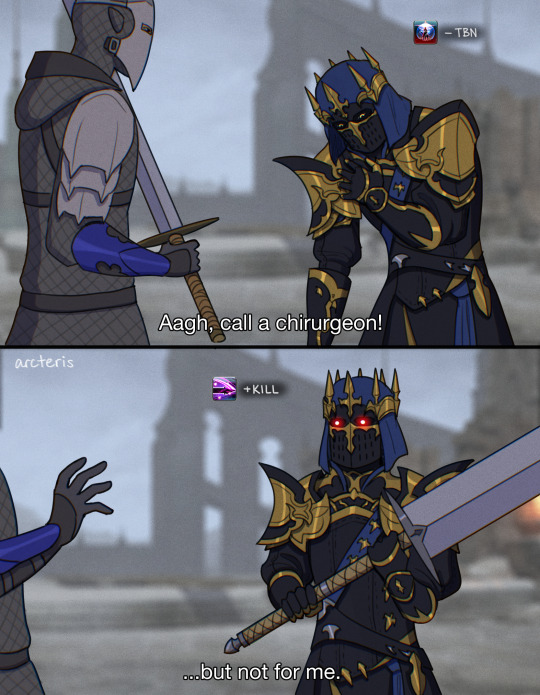
dark knights are pretty great
#ffxiv#ff14#fray myste#recently hit lv.70 on my DRK!! pretty sure this is how the blackest night works#jokes aside holy SHIT @ the stormblood drk quests#definitely one of my fav parts of the entire game so far and some of my fav writing/storytelling in a videogame in general??#so yeah this job was already one of my 2 mains but now i love it even more :')
2K notes
·
View notes
Text
Lord Gwyn: The Perfect Anticlimax
"Dark Souls is a hard game"
To anyone who's even a little bit familiar with the franchise, this is an obnoxiously obvious statement. The game has held the title of THE "hard game" for so long, that not only has the statement "X is the Dark Souls of Y" become a cliche, but so has every subsequent mocking subversion of that comparison. To even acknowledge its obviousness, as I did, is territory so well-worn, that I'm at risk of falling through, into the hackneyed void. But it's still worth mentioning. It's a well-earned reputation. Not only is Dark Souls, on a purely technical level, difficult to beat, but its entire identity is based around its difficulty, if the name of the "Prepare to Die" edition is any indication. Its world is a punishing one, seeking to beat the player character down at every single opportunity, until they can't stand to move another step forward, lest they get thwacked by a swinging axe, skewered by a demon, swept off a cliff, or obliterated by a dragon with teeth where its torso should be. It's a game that crushes you down, intending to make very clear just how easy your character can die, and, importantly, just how unimportant your death will be. To these bosses, these titans, these near-gods, you are nothing but an annoyance. Many of these fights feel like climactic struggles against an ancient, near-unbeatable foe, who existed long before you were born, and has a pretty solid chance of existing after you've expired. When you enter the arena of Ornstein and Smough, the music swells, and the two knights flex the skills that they're going to use to kill you over and over again. Many of the game's bosses, try to tap into that sense of scale, of importance, of grandiosity, each of their respective battles feeling like they could easily be the final one.
Then, after a long struggle, you make it to the end.
The game's final boss is Gwyn, a towering figure who's been hinted at throughout the game, through dialogue and item descriptions. Even if you didn't pay much attention to the little pieces of lore that the game hands you, you're able to put together that he's a pretty important guy: the mighty Lord of Cinder. The buildup to his fight hints at an even larger presence than the other bosses. You travel beneath Firelink Shrine, your home base for most of the game, where you find a massive expanse of land, cold and dark, a mysterious coliseum-like structure looming in the distance, which is impossibly large, even so far away. As you get closer, ghosts of old knights appear to attack you. They are easily dispatched, but still a shock. The structure towers over you, emphasizing just how much space is needed to house this mythologically strong figure, and the power that he holds. You enter, and find…….a hollowed old man. He's slightly taller than you, dressed in robes, and wielding a flaming greatsword, but he's nowhere near the scale of other bosses. However, he rushes at you all the same. When you begin the duel, it feels different from the others. There is no dramatic, sweeping music. All you get is a somber piano, like something that would play during a funeral, rather than a climactic duel. It feels like Gwyn's theme is actively pitying him. Granted, it's appropriate for the fight. All Gwyn can do is swing is flaming blade, which you can avoid with ease. There's been some easier bosses, but at least they didn't feel like they WANTED to die. Besides, this isn't the fragile Moonlight Butterfly, or the starting Asylum Demon, this is the final boss! He should be challenging you! Putting all the skills you've learned to the test! He's a fucking King! Why isn't he stronger? Fighting Gwyn after you've fought everyone else feels like walking into the home of an old, dilapidated hoarder, and kicking him while he's down. If you've been practicing your parrying, its like doing the same, except with cleats. He just seems………tired. As pathetically destitute as you were at the start. He might as well just keel over when you walk in the door. You beat him, naturally, and then the game just kinda….ends. If you got the ending I did, you just exit the area, look at all the nice snake friends you just made, and then roll credits. For all the work you've put into getting here, and all the struggles you've had to overcome, it feels like a severe anticlimax, like the game is playing a prank on you.
But if you know anything about the setting of Dark Souls, you'd know that there's really no other way this could end.
"The world of Dark Souls is dying"
This is a phrase that, while not as oft repeated as the above, is also pretty common knowledge at this point. Lodran, the game's setting, is a desolate place, long past its glory years. Once a powerful kingdom, teeming with life and magic, it is now in ruin, every citizen either dead, hollowed, or left to survive amongst the numerous deadly creatures that now roam the land. Everyone who's still around at the start of the game is either destined for misery, or already there (Unless you're Andre. He seems to be doing pretty well, all things considered). Somewhere around the time Lordran has reached the end of its life cycle, is when the player character enters the story, albeit with a rather unenviable role. Your job is to essentially be the world's janitor, cleaning out the world's former main characters, most of whom are insane, and all of whom are well past their useful days (or, if you have the DLC, you get to see Artorias right as he passes this point). Unfortunately, most of them would like to keep being alive, so they're going to make that difficult for you, by turning you into red mist until you stop trying to kill them. Even the grandiose presentation some of them have can't entirely hide the fact that this is a rather sad state of affairs for everyone, especially for those who haven't really done anything wrong (I nearly cried at having to kill Sif, and I will never fight Priscilla). Fortunately, some of these bastards contributed to the world's current bleakness, so killing them provides at least a twinge of catharsis, albeit one that will certainly be gone by the time you move onto the next bastard. The goal of this whole clean-up process, is to prepare the world to either continue with the age of fire with you as the catalyst, hopefully without those brutes who were clogging the power vacuums, or plunge the world into a new age of darkness, now that it has been cleansed of its polluting influences.
The only mean to either of these ends, is to kill Gwyn, the Lord of Cinder, former ruler of Lordran, and one of the primary reasons that this world is such a goddamn mess. To sum up his actions without getting too deep into the lore's intricacies; Gwyn knew that his kingdom was destined to fall, due to the world's oncoming transition from the age of fire into the age of shadow. This transition was represented by the dwindling light of the first flame, the lifeblood of the kingdom. After utterly failing to rekindle it, Gwyn entered a final gambit to prolong the life of his empire, linking himself with the first flame, but burning himself, and many of his knights, away in the process. This left him as a hollow, doomed to languish in his kiln, until another unfortunate soul took his place, linking the flame to further prolong the changeover. In doing this, Gwyn went against the natural laws of his world, which didn't react well to having its transitionary cycle interrupted. The world fell into a sharp decline, becoming a desolate, unhappy place, festering with demons and monsters (many of whom were the result of the last time someone tried to rekindle the first flame), making life hell for anyone unlucky enough to still be around afterwards. Gwyn wanted to prolong the inevitable, prevent the death of his kingdom, and continue its prosperity, so he sacrificed everything. His realm has persisted, but in a state of undeath, having stuck around long past its natural expiration date, just like him. Gwyn's story can be properly summarized as what happens when someone is psychotically obsessed with preserving their power, even when that preservation only serves to make the world a substantially worse place. Gwyn, in his hollow state, is a symbol of Lordran's persistent deterioration.
None of this information is directly handed to the player. Some bits are alluded to through snippets of dialogue and item descriptions, and the opening cutscene depicts one of the major inciting events of the narrative, but for the most part, it's a sprawling, multi-phased story, that is dolled out non-linearly, and piecemeal.
Now, with that context, let's cast a new lens on that fight…
After delving underneath Firelink Shrine for the final time, you come upon a desolate landscape, the Kiln of the First Flame looming in the distance. It's clearly well past its glory days, looking decrepit and sad. It is home of the world's lifeblood, but in name only. Now, it holds the last remnant of an age long past. As you approach, the spirits of old knights come to attack you, but they aren't much of a challenge, being just shadows of their former selves. They're victims, really; their loyalty has bound them to a sorry task, but they're in the way, and they weren't really living much of a life anyway. When you get closer to the kiln, it feels impossibly large, but also cold, and surprisingly dark, for something that's supposed to house an eternal flame. When you can see more details, it becomes clear just how long it's been falling into ruin. It feels abandoned, but you know its not. After all, you're here to end the life of its only resident. You enter, and find…. Lord Gwyn, a king who destroyed himself and cast the world into ruin, just to hold on to a formerly prosperous time. Lord Gwyn, whose refusal to let the fire die is the reason why you had to struggle through this entire journey. Lord Gwyn, whose death will mark the end of a era, no matter what you do afterwards. He charges at you, barely even conscious anymore, having been locked in this tomb for unknowable amounts of time. But he can't really fight you, at least not well. His strength isn't nearly what it used to be, now that he's a hollow, tired and worn-down, just like you were at the start. He's a pitiable figure, and the music knows. That sorrowful piano fades in, almost like something that would play at a funeral. But this isn't a funeral. This is a mercy killing. Spiritually, Gwyn died a long time ago. You're just putting his body to rest. When he's finally dispatched, it feels like an anticlimax. But of course it is. Gwyn is the embodiment of the world you've spent so much time exploring. Lordran has been denied a proper climax for so long, because he extended the story long past where it should have ended. He's been waiting to be killed for ages now. It feels only right that Gwyn be an easy, anticlimactic boss, because how could such a destitute figure be anything else?
"Dark Souls is a hard game for a reason"
The above statement is a simplified summation of why Dark Souls is one of my favorite games that I’ve ever played. It's set in a dying, hostile world, that's been brought to ruin by the violation of its natural laws. Thus, the game is insistent on making the player struggle at every turn, to make them feel just as downtrodden as the world they explore. Lord Gwyn is a example of just how thoroughly holding onto power can corrupt someone, leaving them as a husk, the scraps of their former glory existing only the in the memory of the people who are still forced to cope with the consequences of their selfish actions. Thus, his boss fight is an intentionally easy anticlimax, to emphasize just how far he's fallen, to the point that he can't even put up a good point. It's the themes of his character, perfectly melding with the gameplay. It's a perfect encapsulation of the game's best quality, how the experience of playing the game, reflects the themes and tone of its story. The reasons why the fight with Gwyn is the perfect anticlimax, and why Dark Souls is a near-perfect game, are one and the same.
#video games#gaming#dark souls#dark souls 1#fromsoftware#fromsoft games#Gwyn#game writing#game analysis#boss fight#videogame#game#long post
106 notes
·
View notes
Text


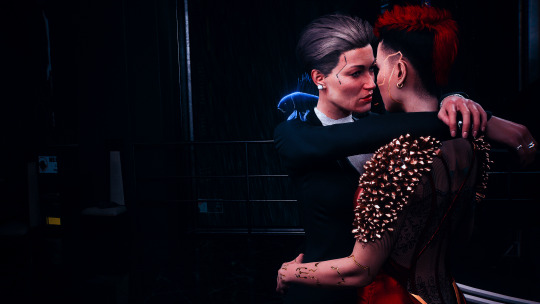
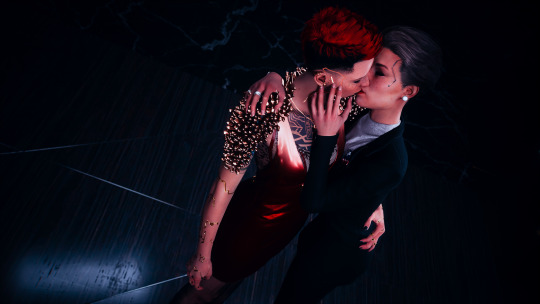
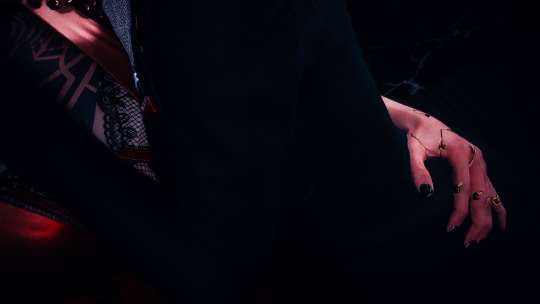
The date we were promised.
#cyberpunk 2077#cyberpunk 2077 photomode#cp2077edit#cyberpunk photomode#videogame photography#dailygaming#my screens#rosalind myers#president rosalind myers#madam president#valerie vermilion#streetkid!val#myers x v#myers x fem v#wlw ship#milfguard#aka president's merc au#shippy saturday#shippy everyday#god i love this set#need to finish writing the scene it inspired
62 notes
·
View notes
Text
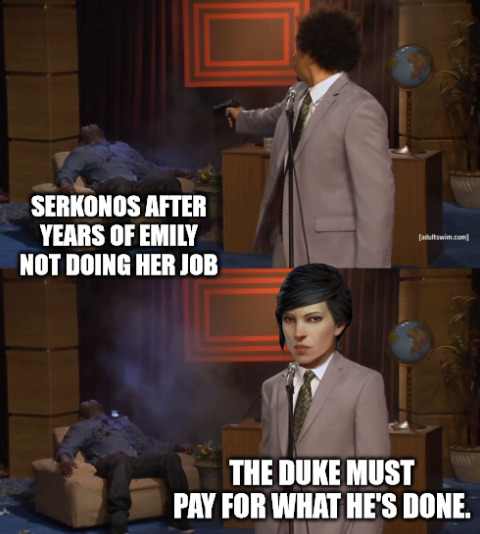
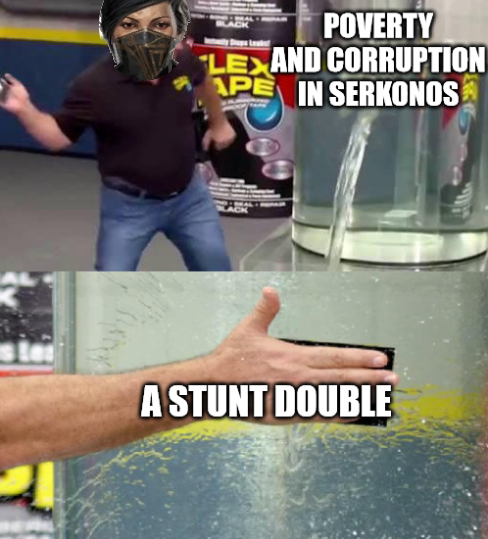
high chaos/low chaos/join the chaos in my dishonored 2 rewrite
#dishonored#dishonored 2#emily kaldwin#billie lurk#dishonored 2 spoilers#dishonored spoilers#dishonored fanfic#the monster in the hull#yeah yeah yeah the duke was responsible for this but also like. why did emily let someone that incompetent run the show so long#re: the stunt double solution. when i frame it like this it makes emily seem careless#she was and that's the point! but also to me it's#exhibit A for: 'we had a cool game mechanic idea so we forced the story to fit around it'#it is extremely cool to have a body double involved in an assassination (bet they considered twins at some point)#but her solution defs doesnt make emily look good. which again. its a AAA game they dont expect ppl to think bout it#the pain of being a Narrative Enjoyer in a Videogames Need Gimmicks world#so i addressed this even if just a little in the fic. didn't want to derail majorly it's slowburn enough already.#stop! stop! it's already slow burn!! etc etc. haaaaa#yeah it's 100k at this point. added some scenes probably splitting final chapter into 2#because like arkane i too cannot resist a gimmick *sighs and fist bumps a corporate entity*#pres writes essays in tags
134 notes
·
View notes
Text
How to write a good metaphor
yall seemed to like my post on "how to write good horror" so i figured i should make another one of these.
1- do. not. explain. the. metaphor.
don't.
"oh but how will the audience know my deep and meaningful message- "
SOME PEOPLE WONT GET IT. if you explain what you mean then suddenly the metaphor won't be deep anymore. it becomes a generic forced message.
i know you are tempted to make a character infodump about everything, fucking don't.
followup on this:
2- a good metaphor should potentially have multiple interpretations.
"but i don't want people to get the wrong impression of the story!"
then you either need to make damn sure its an elegantly written metaphor, or none at all.
the death of the author is the idea that everyone has their own vision of a story they read, rearguards of authors intent. you need to come to terms with this or else you won't improve your writing skills.
you need to trust that your audience is intelligent enough to understand the metaphor on their own without bashing them over the head with it. sometimes people misunderstand meaning, it is a fact of life.
The game little inferno was thought of as a metaphor about pollution, in which later the creators went out to say it was actually about capitalism and wasting your life with things like exploitative mobile games.
you just need make it SUBTLE and hope for the best.
3- The story/gameplay/etc should inform the metaphor(and sometimes reference real life examples)
To mention little inferno again, the "you must wait x amount of time for in-game item to be given to you" is a mirror of mobile games in the real world that use timers to leach money from you.
another example: analogue horror.
broken old technology is scary on its own, but many good analogue horror artists tend to use this to the advantage.
analogue horror can be used as a metaphor for dying trends and technology, like how in the 30's through 70's we used asbestos in the walls. Analogue horror makes a great parralel to this idea (see Blue_channel by gooseworx for a good example.) . the audience questions WHY this is on an old CRT tv and not just a smartphone, perhaps to imply this was an event that happened years ago.
undertale is another example, where most RPG's encourage you to fight and to level up, undertale uses this as a simple metaphor about obsessive control and being cruel to get an arbitrary achievement (i recommend the escapist's video on "why i didn't review undertale" on youtube for way better examples)
tldr: a metaphor is stronger if you lightly reference real life occurances and implement your metaphor in the medium presented.
4- the curtains are blue because they are blue.
not everyone is going to understand your metaphor
and not everyone is going to notice every single little metaphor you add to your story.
remember those teachers that would constantly stretch to imply something in a story is a metaphor and that the curtains are blue because of some deep metaphor for death and sadness and shit?
those teachers are full of it. ignore them.
metaphors are allowed to be simple. not every metaphor needs to be a hyper deep depth defying world changing thing. I could even argue a bunch of small metaphors connected to each other can be better than one big metaphor depending on your story.
relax. don't think too much about it because your average audience member won't.
5- study movies, tv, books, games, etc and understand why their metaphors work.
don't fall into that "the curtains are blue because of a deep message" English teacher mindset mind you.
"but how do i tell what is and isn't a metaphor?" you may ask
simple. trust your gut. you won't understand everything you come across but the human brain has a way of telling what is and isn't a metaphor in stories.
(spoiler about bugsnax)
I could argue Bugsnax is a metaphor about drug abuse and addiction. The characters have personality traits commonly associated with people vulnerable to drug addiction. An athlete, a hippy, a married couple going through a rough spot in their marriage with the threat of divorce, a mentally ill person with trauma and paranoia, etc.
It isn't obvious, many people may disagree with me, but you can't deny that there are signs i may be right.
(end of spoiler)
the point i am trying to make: don't stretch to find a metaphor when you don't see one. if you are curious google other people's theories and make your own opinion. metaphors are hard and you will learn over time.
and finally
6- do not ever do "it was all just a dream" or "the character is secretly in a coma" etc
this applies to writing in general but it is still related to metaphors.
the only time i have seen this done well is driver san francisco, but what it did right was A- make it so the players can guess ahead of time the mystery, such as the radio saying voices of your character in the hospital, or if you zoomed out you could hear a heart monitor. and B- it didn't completely un-do the entire story.
that is my core issue with this trope. it either wastes your time un-doing the entire story readers worked hard to finish, or it is just nonsensical and terrible.
"dora the explorer is actually in purgatory!"
"spongebob is a metaphor for the 7 deadly sins!"
"ash is in a coma and that is why he never ages! "
ooooor it is a cartoon and you are forcing meaning that doesn't exist in something that doesn't even imply it.
the world being a bit weird is not enough to be a metaphor for anything. If you want to make a good metaphor: do more effort than just slapping a lazy "it was all a coma" thing at the end. Like horror, stuff like this needs to be built up properly.
also consider authors intent. I understand death of the author and all of that, but do you really think a retired marine biologist made spongebob to be a complex metaphor about sinners in hell ? (rip Stephen Hillenburg btw. we didn't deserve him.)
thank you for reading, hope this helps.
and please, learn to understand the tropes of metaphors before you attempt to make the story of a generation.
edit- adding a couple more things i forgot
7- "the darkness is going to destroy the land or whatever!"
i see this used all the time.
spooky wookey dark shadowy bits going to destroy a land and is the hero's generic bad thing to fight.
stop it. it is not a deep and complex metaphor about depression or whatever the hell you are on about. its lazy and stupid.
8- a story should stand up on its own regardless if audience members understand the metaphor or not
I don't like Gris.
it is a very pretty game with lovely visuals
But also the entire story is just the main character moping about artistically and shit and go on about how artistically sad and dramatic this all is.
if i don't understand the story without understanding the metaphor, then your story and your metaphor sucks.
an example of a metaphor done well: spiritfairer
without the metaphor, it is a simple game about running a traveling boat. even if you didn't care too much about the deeper meaning it is a cute story and the gameplay is fun
(spoiler)
if you look deeper, it can also be taken as a metaphor about greif and learning to accept your loved ones will one day die. things like the boat being filled with empty houses you can't remove is a good example of this.
(end of spoiler)
your story needs to stand up on its own to be good. don't use a metaphor as a crutch.
#writing#writing advice#writing tips#classic horror#horror#analogue horror#bugsnax#little inferno#zero punctuation#creative writing#fanfiction#fanfic#film#comics#videogames#movies#bad writing#bad writing advice#metaphors#metaphor
475 notes
·
View notes